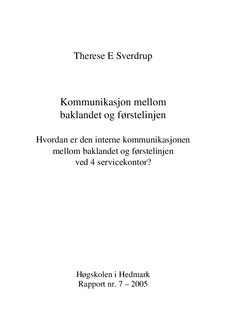Kommunikasjon mellom baklandet og førstelinjen : hvordan er den interne kommunikasjonen mellom baklandet og førstelinjen ved 4 servicekontor?
Research report
Permanent lenke
http://hdl.handle.net/11250/133834Utgivelsesdato
2008-08-14Metadata
Vis full innførselSamlinger
Sammendrag
Norsk: Formålet med studien var først og fremst å bidra til forskning på fenomenet servicekontor, med spesiell vekt på den interne kommunikasjonen mellom førstelinjen og baklandet i 4 kommuner. Forholdet mellom førstelinjen og baklandet ble undersøkt ved å intervjue 18 informanter i 4 kommuner om: hva de kommuniserte med hverandre om, hvordan de oppfattet arbeids-delingen dem i mellom, samt hvordan de oppfattet samarbeidet, omgangs-tonen, grupperinger og servicenivået i kommunen. Til sist ble de spurt om hvordan det ideelle servicekontoret ville fungert, sett i forhold til sam-arbeidet mellom førstelinjen og baklandet. Resultatene viste at majoriteten av informantene mente kommunikasjonen mellom førstelinjen og baklandet kunne bli bedre. Videre ble arbeidsdelingen oppfattet ulikt av baklandet og førstelinjen, der baklandet var mer fornøyd med arbeidsdelingen enn første-linjen. I forhold til informantenes serviceforståelse, opplevde førstelinjen at baklandet ikke hadde samme serviceforståelse som dem. For å få til bedre kommunikasjon, ble det anbefalt å ha oftere møter mellom førstelinjen og baklandet, at servicekontoret skal få tilført flere saksbehandlingsoppgaver og at hele kommunen utvikler en felles serviceforståelse. English: The aim of the study is to contribute to the analysis of one-stop shops. The specific focus is to analyze the internal communication between front-and back-office in four municipalities. The relationship between front- and back-office was investigated by interviewing 18 employees in four municipalities about: what they communicated about, how they experienced the division of work, and how they perceived the cooperation, the informal tone, groupings and the service level in their municipality. The informants where also asked about how the ideal one-stop shop looks like, considering the relationship between front- and back-office. The results showed that the majority felt that the communication between front- and back-office could be improved. Furthermore, the division of work was perceived differently between front- and back-office personnel, with the back-office as more satisfied with the division of work then front-office personnel. Considering the informants view of what constitutes good service, front-office personnel felt that most of the back-office personnel had a different opinion about how good service is delivered. To improve the communi-cation between the front- and back-office it was recommended that front-and back-office had more meetings, that the one-stop shops could carry out more formal tasks, and that the municipality develops a mutual understanding of what constitutes good service.
Serie
Rapport07/2005
